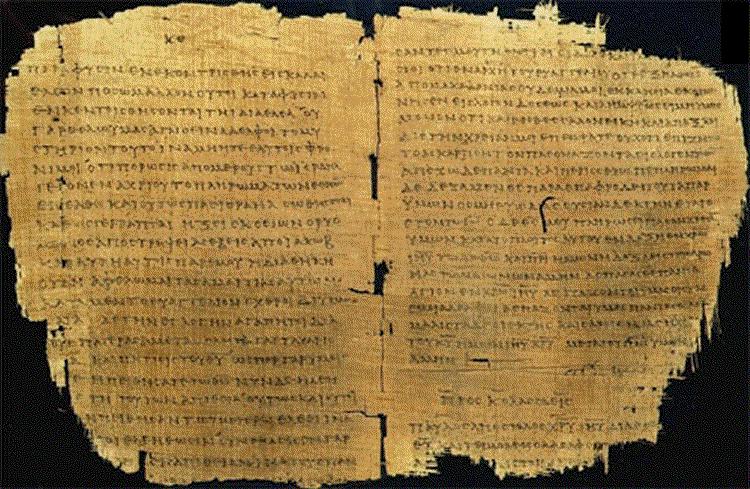Three Ways the New Testament Writers Quote the Old Testament
Dr. Robert K. Rudolph, Professor of Systematic Theology and Christian Ethics at the Theological Seminary of the Reformed Episcopal Church in Philadelphia from 1932-1981, wrote something of a short introduction to systematic theology for one of his sons. As a young believer I was privileged to read them. You can find a PDF version of them here. In this work Rudolph highlighted and defended the way in which the NT authors employed the OT in their writings. He wrote:
The charge is made that the writers of the New Testament did not treat the Old Testament as verbally inspired since they do not always quote the Hebrew literally. Christ and the Apostles gave their quotations from the Old Testament in three different ways:
First, they quote the Hebrew in the Greek making quite a literal translation.
Second, they simply quote from the Septuagint, using the Greek as expressed by the alleged “70” (LXX) (Septuagint: Scholars who in Egypt translated the Old Testament Scriptures into Greek for the use of the Jews and the Greek converts to Judaism who lived there after the captivity at the end of the Old Testament).
Third, they make a very “free” and quite interpretive translation of the Hebrew. Since, therefore, the New Testament writers did not regard an exact rendering of the Hebrew as of importance, it is argued that this proves that we are not to believe in verbal inspiration.
But this does not, in fact, prove any such point, as one can understand if he think clearly about the matter. When we desire to express ourselves in a last will and testament–and to express ourselves exactly–we do often express ourselves in more than one way. If, for instance, we desire to leave our estate to one specific person we may give, devise and bequeath all that property, whether real or personal, of which we may be possessed upon our death, to…such and such a person. But we may well know that there is someone else who will try to make some kind of claim, perhaps that we simply forgot about them, or perhaps that we were under undo influence to forget them. To guard against this–though we have clearly said that we left ALL to one person–we WILL nevertheless add the name of the person who we fear may make a claim, and make it very clear that we did not forget about them by leaving them a specific amount–say, five dollars! We have by this means used two forms of expressing what we desired to make plain for the very purpose of making the matter specifically clear; and in the very forms used above more than one form is used. We do not simply leave all that we have–this might be misinterpreted, but we give, devise, and bequeath; and not merely all that we have, but all of our property whether real or personal. By saying what we have to say in more than one way, we have made it just that much more clear as to what our intention is. No judge or court comes along and then says, “Since this man expressed his desire in several ways so as to make very plain his meaning, we therefore judge that he was not interested in the words he used and we may therefore substitute for his words any other words–however they may reinterpret the matter.” The court concludes, from the above process, the very reverse: That the testator shows by his careful statement and restatement of his purposes how very jealous he was to have his words highly regarded so that he could cause to be understood his very and particular meaning.
What our liberal scholars are doing in this attack is to use the argument so that they may restate what God has spoken in such other words that His purpose is lost and their interpretation inserted.
Actually, God, the Holy Spirit, by whom God the Father, and God the Son, gave the Bible to mankind, has caused the writers thus to express the truths in several ways by transliterating under His control, the first appearance of the truth which He gave in different manners so that His meaning is thus made the more clear. The fact that the Holy Spirit thus re-expressess Himself gives no license to the readers to say that He was not jealous of the words He used! His very re-expression does, in fact, reveal just such a jealousy that His meaning be guarded and circumscribed!1
You can find several of Dr. Rudolph’s class lectures on ethics and theology below. I apologize for the poor audio quality. Please spread these around as Dr. Rudolph’s son, Karl, has given me permission to make them public.
Robert K Rudolph Theology #3: The Ordo Salutis
Robert K Rudolph Theology #4: The Problem of Human Goodness
Here are Dr. Rudolph’s notes comparing 1 Cor. 1:21 to Romans 1:18-25. You can see the influence that Van Til had upon Dr. Rudolph from these, and the former notes. Here are some of RKR’s brief, yet substantive, thoughts on the attributes of God. You can also read Dr. Rudolph’s notes on A Christian Theory of Knowledge, and on baptism. Thanks to Niel Bech and Paul DiBenedetto for making these available.
You can find a Facebook page commemorating the life and teaching of Dr. Rudolph here.
1. Robert K. Rudolph An Introduction to Theology (Unpublished) pp. 4-5




Pingback : How does the New Testament use the Old? | THINKAPOLOGETICS.COM